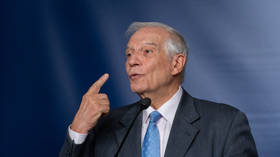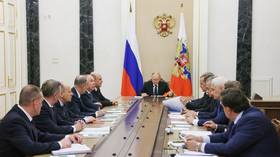EU’s Borrell backs US ATACMS missiles U-turn

The EU’s outgoing foreign policy chief, Josep Borrell, has defended Washington’s authorization for Kiev to use US-supplied long-range missiles for strikes deep into Russia – saying the move is in accordance with international law.
Speaking at a press briefing on Tuesday ahead of the bloc’s Foreign Affairs Council meeting, Borrell expressed hope that EU nations will follow suit. On Monday, he confirmed reports that US President Joe Biden had removed the restrictions on Ukraine’s use of ATACMS missiles.
“After long discussions, President Biden authorized the use of long-range weapons [up to] 300 kilometers inside Russian territory,” the top diplomat said, adding that this is “very good news for the Ukrainians.” Borrell said he “applauds” the decision.
Regarding a common stance among EU nations, the bloc’s foreign policy chief said this was an individual decision for each country. “Some member states are already doing that, openly, and others, they are doing it without saying it,” he added.
Borrell went on to describe Washington’s policy shift as being “fully in accordance with international law” and expressed hope that “all [EU] member states will follow the US decision.”
The New York Times reported on Sunday that Biden had removed long-held restrictions on Ukraine’s use of ATACMS missiles, but the administration has not yet officially confirmed the policy change.
The Russian Defense Ministry has said Kiev fired six long-range ballistic missiles identified as ATACMS early on Tuesday into Russia’s Bryansk Region. Five of them were intercepted with S-400 and Pantsir air defense systems, while another was damaged and hit the ground at a Russian military site in Bryansk Region, causing a fire that was quickly dealt with, the statement said. The Russian military claimed that no damage was caused.
French daily Le Figaro reported on Sunday that France and the UK have followed Washington’s lead, and decided to allow strikes with their weapons on Russia’s internationally recognised territory. The daily, however, later deleted its claim that the countries had authorized the use of SCALP/Storm Shadow missiles for such strikes.
Foreign Minister Jean-Noel Barrot later told reporters that Paris was still considering whether to allow Ukraine to target Russian territory with French-supplied missiles.
On Tuesday, Russian President Vladimir Putin authorized a new nuclear doctrine, bringing into force changes he first announced in September. The updated document says Russia may use nuclear deterrence to prevent aggression by hostile powers and military blocs that possess weapons of mass destruction or large arsenals of conventional weapons.
It also states that an attack by a foreign nation that does not have weapons of mass destruction but is backed by a nuclear power should be considered a joint attack by both.
Kremlin spokesman Dmitry Peskov urged foreign leaders on Tuesday to carefully study the new doctrine.














